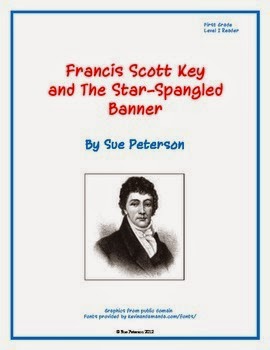Happy 200th birthday to the American national anthem, “The Star-Spangled Banner!”
During the War of 1812, on September 13–14, 1814 Francis Scott Key watched Fort McHenry being bombed by the British forces in the Battle of Baltimore. In the morning, Key could see that the American flag was still flown over Fort McHenry, showing that the Americans had not lost possession of it. The inspired Key’s to write a poem, which became “The Star-Spangled Banner”
Learn more about Francis Scott Key with your class with my book Francis Scott Key and The Star-Spangled Banner: First Grade - Level I Reader.
This first grade Level I reader gives students the interesting background of the United States national anthem "The Star-Spangled Banner". Francis Scott Key and the American Flag are also featured in my First Grade Level I – Set 2 book set.
My five-page Level O reader The Founding Fathers is a wonderful resource to bring information about life in the American colonies about the founders of the United States into your classroom. The book comes with three accompanying worksheets to help reinforce literacy skills involving reading comprehension, language, spelling, and writing.
Your class can learn more about some of America’s other important Founding Fathers in my third grade level O reader Ben Franklin - A Man with an Electric Personality
my first-grade Level G reader Ben Franklin, my second grade Level L reader John Hancock and a Study of Pronouns. Your students will learn more about The Liberty Bell, and The United States Flag in my set of leveled books Social Studies Topics - Leveled Books: First Grade Levels H/I

